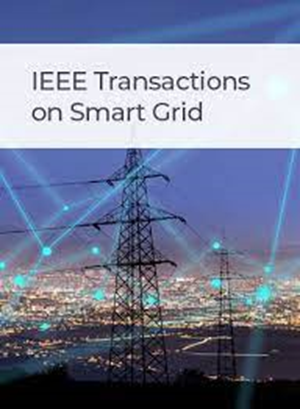考虑短期能力和长期灵活性的异构储能系统分布式频率控制
IF 8.6
1区 工程技术
Q1 ENGINEERING, ELECTRICAL & ELECTRONIC
引用次数: 0
摘要
可再生能源给电力系统带来了更多波动,给维持系统稳定带来了挑战。传统发电设备逐渐被取代,可能很快就无法满足频率调节(FR)的要求。因此,用于频率调节的需求侧资源受到越来越多的关注。在需求侧资源中,变频空调(IAC)具有巨大的调节能力,在夏季占总用电量的近 40%,而储能系统(ESS)则具有快速响应和强大的斜坡速率。然而,由于 IAC 的斜坡速度不足和 ESS 的调节能力不足,它们无法独立提供 FR。针对这一问题,本文提出了一种分布式协调控制算法,可有效利用 ESS 和 IAC 的各自优势提供故障恢复。首先,考虑到异构参数,引入了与 ESS 一致的 IAC 等效热能存储模型。随后,针对由 ESS 和 IAC 组成的异构 ESS(hetero-ESSs)提出了一个协调控制框架。基于该框架,为异构 ESS 设计了一种分布式共识算法,并通过应用 Lyapunov 定理证明了该算法的稳定性。最后,数值研究验证了所提出的框架能提高 ESS 的短期能力和 IAC 的长期灵活性。本文章由计算机程序翻译,如有差异,请以英文原文为准。
Distributed Frequency Control of Heterogeneous Energy Storage Systems Considering Short-Term Ability and Long-Term Flexibility
Renewable energy sources introduce more fluctuations into the power system and bring challenges to maintain the system stability. Conventional generation units are gradually replaced and may soon become inadequate to meet the frequency regulation (FR) requirements. Consequently, demand-side resources for FR have received increasing attention. Among demand-side sources, inverter air conditioners (IACs) have huge regulation capacity and account for nearly 40% of the total power consumption in summer, while energy storage systems (ESSs) excel in rapid response and powerful ramp rate. However, the inadequate ramp speed of IACs and the insufficient regulation capacity of ESSs render them incapable of providing FR independently. To tackle this problem, this paper proposes a distributed coordinated control algorithm that allows the effective utilization of ESSs and IACs to provide FR considering the respective advantages. Firstly, an equivalent thermal energy storage model of IAC in alignment with ESS is introduced considering heterogeneous parameters. Subsequently, a coordinated control framework is proposed for heterogeneous ESSs (hetero-ESSs), which are composed of ESSs and IACs. Based on the framework, a distributed consensus algorithm is devised for hetero-ESSs, and its stability is demonstrated through the application of the Lyapunov theorem. Finally, numerical studies verify that the proposed framework can promote ESSs’ short-term ability and IACs’ long-term flexibility.
求助全文
通过发布文献求助,成功后即可免费获取论文全文。
去求助
来源期刊

IEEE Transactions on Smart Grid
ENGINEERING, ELECTRICAL & ELECTRONIC-
CiteScore
22.10
自引率
9.40%
发文量
526
审稿时长
6 months
期刊介绍:
The IEEE Transactions on Smart Grid is a multidisciplinary journal that focuses on research and development in the field of smart grid technology. It covers various aspects of the smart grid, including energy networks, prosumers (consumers who also produce energy), electric transportation, distributed energy resources, and communications. The journal also addresses the integration of microgrids and active distribution networks with transmission systems. It publishes original research on smart grid theories and principles, including technologies and systems for demand response, Advance Metering Infrastructure, cyber-physical systems, multi-energy systems, transactive energy, data analytics, and electric vehicle integration. Additionally, the journal considers surveys of existing work on the smart grid that propose new perspectives on the history and future of intelligent and active grids.
 求助内容:
求助内容: 应助结果提醒方式:
应助结果提醒方式:


